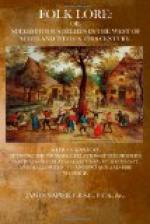This practice was continued within my recollection. The first care of the young married wife was still, in my young days, to spin and get woven sufficient linen to make for herself and her husband their dead claes. I can well remember the time when, in my father’s house, these things were spread out to air before the fire. This was done periodically, and these were days when mirth was banished from the household, and everything was done in a solemn mood. The day was kept as a Sabbath. The reader will not fail to observe in some of these modern customs and beliefs modified survivals of the old Roman practices and superstitious beliefs.
CHAPTER IV.
DEATH.
It is not surprising that the solemn period of death should have been surrounded with many superstitious ideas,—with a great variety of omens and warnings, many of which, however, were only called to mind after the event. In the country, when any person was taken unwell, it was very soon known over the whole neighbourhood, and all sorts of remedies were recommended. Generally a doctor was not sent for until the patient was considered in a dangerous state, and then began the search for omens or warnings. If the patient recovered, these premonitions were forgotten, but if death ensued, then everything was remembered and rendered significant. Was a dog heard to howl and moan during the night, with his head in the direction of the house where the patient lay; was there heard in the silent watches of the night in the room occupied by the sick person, a tick, ticking as of a watch about the bed or furniture, these were sure signs of approaching death, and adult patients hearing these omens, often made sure that their end was near. Many pious people also improved the circumstance, pointing out that these omens were evidence of God’s great mercy, inasmuch as He vouchsafed to give a timely warning in order that the dying persons might prepare for death, and make their peace with the great Judge. To have hinted, under such circumstances, that the ticking sounds were caused by a small wood moth tapping for its mate, would have subjected the hinter to the name of infidel or unbeliever in Scripture, as superstitious people always took shelter in Scripture.




